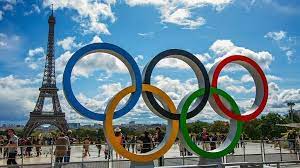Moscow (AFP): The attack on a Moscow concert hall that killed more than 130 people has raised fresh security fears for the Paris Olympics, leading France’s interior minister to promise Monday that police and intelligence services would be “ready”.
The government upgraded the country’s terror threat level to its maximum on Sunday, with France a frequent target of the Islamic State (IS) group which has claimed responsibility for Friday’s bloodshed in the Russian capital.
President Emmanuel Macron said Monday that the IS entity believed to be behind the killings — known as Khorasan, which is a branch in Afghanistan and Pakistan — had also sought to attack France.
“This particular group made several attempts (at attacks) on our own soil,” Macron told reporters after arriving on a trip to the French South American region of French Guiana.
Interior Minister Gerald Darmanin said that the Paris Olympics, which begin on July 26, were an obvious future target.
“France, because we defend universal values, and are for secularism… is particularly threatened, notably during extraordinary events such as the Olympics,” he told reporters.
“The French police, gendarmes, prefects, intelligence services, will be ready,” he added, saying that “we have a very effective intelligence system. We stop plots developing almost every month.”
The heads of intelligence services would hold a meeting on Thursday “to discuss all the conclusions of the attack on Moscow,” he added.
French Prime Minister Gabriel Attal said that 4,000 extra soldiers would be deployed nationwide in the days to come.
“The terrorist threat is real, it’s strong,” he told reporters, adding that two plots had been thwarted already this year.
Terror plots
At least 137 people were killed when gunmen stormed Moscow’s Crocus City Hall on Friday evening before setting the building on fire.
The assault echoed an attack on the Bataclan music venue in Paris in November 2015 which left 90 people dead and was also claimed by the Islamic State group.
The Olympics have been attacked in the past — most infamously in 1972 in Munich and again in 1996 in Atlanta — with the thousands of athletes, huge crowds and live global television audience making it a target.
French organisers have faced persistent questioning over their choice of opening ceremony, which is set to take place outside of the athletics stadium for the first time.
Athletes are instead set to sail down the river Seine in a flotilla of river boats in a made-for-TV extravaganza that has been resisted by some security officials because of the challenges for police.
Organisers say there is no plan B, but have suggested that the ceremony might be downgraded — meaning athletes might not board the boats — in the event of credible threats against the event.
“Our fight against terrorism is not just about words. It is very concrete and our hand will never tremble in the face of terrorism, never in the face of Islamism,” Attal added.
French security forces are screening up to a million people before the Games, including athletes and people living close to key infrastructure, according to the interior ministry.
France was last placed on its highest terror alert in October after a suspected Islamist burst into a school in the north of the country and stabbed a teacher to death.
The alert was downgraded in January.
The highest alert of the so-called “Vigipirate” system means that security forces will maintain a more visible presence on French streets and be posted in front of possible targets such as a government buildings, transport infrastructure or schools.
Attal said that 45 terror plots had been thwarted in France since 2017.
The two incidents this year involved a 22-year-old who was suspected of planning an attack on either a nightclub, or the LGBT or Jewish community, and a 62-year-old suspected jihadist with the intention of targeting the Catholic church, prosecutors said in a statement.







